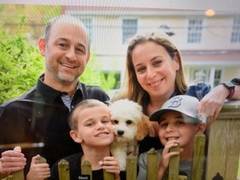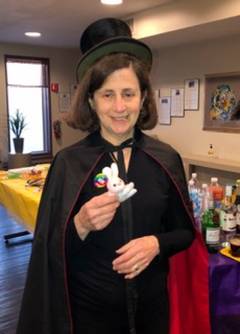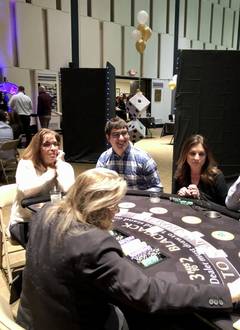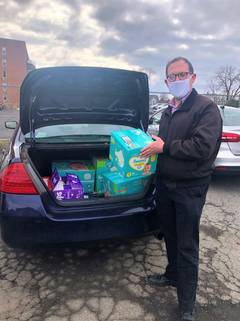The Spotlight of Empathy (Rosh Hashanah Day 2 5786)
09/24/2025 07:56:50 PM
Rabbi Ben Goldberg
| Author | |
| Date Added | |
| Automatically create summary | |
| Summary |
Funny things happen when you hang a shingle out as a rabbi. Take the random calls I get from people asking for tzedakah. Thanks to your generosity to my discretionary fund, I’m usually able to help in some way, and I chose to do so. While occasionally I’m able to help someone local and even within our community, mostly these calls are from people who aren’t immediately local and sometimes aren’t even Jewish. Honestly, I have no idea how these people find me. But their calls sometimes leave me uncertain as to what to do.
On the one hand, part of me feels that I cannot in good conscience turn away from the cries of someone asking for help. Each person who asks has a heart-wrenching story, and these are people for whom $50 or $100 makes a material difference. I do not believe that our public and private safety nets are so perfect, such that there aren’t people out there who just need a little cash. I feel for these people, and if it were me, I would want a rabbi or Jewish community to help me out. And, the thrust of everything I’ve ever learned about Judaism says that other people’s material needs are my spiritual concern. I have the money sitting in an account just for this purpose. So almost always I say yes. And while the money certainly helps, the friendly conversation with someone who cares I’m sure is appreciated too.
Still, I wrestle with this approach. I have no way, most of the time, to independently verify what I’m being told. I assume most people are telling me the truth, but I don’t know that. I also struggle with the limits of what I can or should do for these people, and occasionally do things I regret.
Still, on the balance, I let my empathy win out. I’d rather err on the side of giving to someone who doesn’t really need it, whatever that means, than withholding help from someone who really does.
I mention this because I want to talk about empathy. This past year saw–unusually, I think–this moral virtue catapulted into the center of our political-cultural discourse. You may recall that Elon Musk, at the height of his controversial role in the current administration, sat for a podcast interview. While discussing states that provide health care for immigrants who are not in the country legally, Musk remarked: “we've got civilizational suicidal empathy going on…I believe in empathy. … I think you should care about other people, but you need to have empathy for civilization as a Whole and not commit a civilizational suicide…”
Musk continued: “The fundamental weakness of Western civilization is empathy. The empathy exploit. They're exploiting a bug in Western civilization, which is the empathy response. And I think empathy is good, but you need to think it through and not just be programmed like a robot.”
If I understand Musk correctly, he is suggesting that the well-meaning impulse toward empathy–in this case, by providing health care to sick people–has been exploited by people whose presence has negative impacts on society as a whole.
Musk’s comments are part of a larger anti-empathy trend that has emerged in recent years, where a feeling and moral virtue that was once universally considered a positive thing has been subject to scrutiny and criticism. As one journalist recently noted: “Empathy has had a strange journey over the last decade. It has been variously assailed as too parochial, too indiscriminate, too feeble, too powerful.”
Indeed, empathy as a virtue has come under attack from across the political and cultural spectrum. Two recent books by conservative Christian writers suggest that empathy has been weaponized by the political and cultural left into the accusation that anyone who disagrees with its policy positions must be cruel and uncaring. Instead, these authors suggest that true Christian love can sometimes require policies that may harm people, all in the pursuit of what is truly in their best interest, as revealed by scripture and its interpretation. Otherwise, as one of these authors wrote, “our identification with and sharing of the emotions of others overwhelms our minds and sweeps us off our feet.”
Interestingly, criticism of empathy can also be heard from the political-cultural left as well. Some say empathy can become a way to feel like a good person while leaving in place the structures and systems that cause harm. Others on the left object to expressing empathy for those they consider at least partially responsible for their own misfortune, whether they were people who declined COVID vaccination and later died of the disease, or assassinated United HealthCare CEO Brian Thompson or, more recently, the conservative activist Charlie Kirk.
A decade ago, the Yale psychologist Paul Bloom also made a provocative case against empathy, which he defined as the attempt to feel what you think another person feels. Bloom argues empathy can actually get in the way of being good and caring people. He helpfully compares empathy to a spotlight that focuses attention on a particular person in a particular moment. While this may cause us to feel more concerned about that person, it can also lead us astray. Empathy, like any strong emotion, can be easily swayed and manipulated. We are more inclined to feel empathy for people we already share some affinity with. The spotlight of empathy can cause us to attend more to immediate suffering and less to long-term implications of any particular choice.
Most importantly, the spotlight of empathy leaves in the shadows many other people and considerations, especially in situations where the consequences of our actions are unclear, delayed, or difficult to assess, as they often are. Finally, while stories of an individual’s suffering hold our attention, there are some real limits to the empathy we can display to much larger groups of people who are also suffering. There are only so many people toward whom we can experience the intense emotional connection of empathy. As a quip (falsely) attributed to Joseph Stalin goes: “A single death is a tragedy; a million deaths is a statistic.”
So, given all of these criticisms of empathy, how exactly should we relate to the suffering of others? As with pretty much any virtue, I think the right path lies in the midpoint between two extremes. On the one edge, we have cruelty, not caring at all about other people, or even taking a kind of perverse pleasure in their suffering. On the other end, we have an extreme, unbounded empathy, where we come to entirely identify with the suffering of whoever is in front of us. And, at the midpoint between these two things, we have what we might call compassion, rachamim, which is a general concern for the well-being of others and a desire to help, with a commitment to think carefully about how best to ensure that well-being.
The liturgy of Rosh Hashana is saturated with references to compassion, although mostly on God’s part. We ask for God to have compassion on us as a father has compassion on his children. We ask God to listen to the Jewish people’s shofar blasts with compassion, and to hear and accept our prayers with compassion.
The Divine compassion we pray for obviously differs from ours. One teaching says that God, in God’s infinity, can attend to the cries of the entire world all at once. God has no need for the spotlight of empathy. But we mortal human beings cannot focus on even two people’s cries coming at us simultaneously. Truly hearing another person’s cry of distress is an all-encompassing act that crowds out the possibility of hearing multiple such cries at once.This teaching, reminiscent of Paul Bloom’s critique of empathy, reminds us that there are some significant limits to how much we can really feel another person's pain. This is yet another way that our tradition continuously reminds us that we are not God.
Yet, in our own lives, we also can exercise the compassion we plead with God for on this day. After all, God’s compassion is analogized to that of a human father for his children. Furthermore, the Hebrew word for compassion, rachamim, is closely related to the Hebrew word for womb, rehem. The very word for compassion in Hebrew conjures up the emotional bond between mother and child, a sense of love and kinship that confers a responsibility of care. Parental concern, the sense of close identification with one’s child, is at the root of compassion.
Speaking more broadly, we can say that compassion is a quality of relationships. That is, in order to act with compassion, we have to know something about the people who are the objects of our compassion. We have to get close and intimate, such that the illusion of separateness dissipates a bit, and we see that what we thought were two are, in some important sense, one. That’s why pregnancy is the Jewish tradition’s paradigm of compassion: two who are really one.
Indeed, precisely where there is the greatest sense of separateness does the Torah command that we act with compassion. “You shall not oppress a stranger, for you know the heart of a stranger: You were strangers in the land of Egypt.” We may look at people who are not like us–from a different background or walk of life–and think: I have nothing to do with these people or their needs. Indeed, we naturally identify with the people who are most like us.
Precisely to counter this does the Torah command compassionate action–or at least, not harming–the people with the smallest claim on our empathy. Rather, we are asked to remember our own past experiences with oppression and alienation–the heart of the stranger–and to transform our own suffering into compassion for others who are not like us, rather than indifference or cruelty. Compassion transcends the gap between the self and the other.
There’s another way that our compassion can imitate God’s: the ways that compassion tempers justice and vice versa. Today, Rosh Hashanah, marks the anniversary of creation, so it’s worth thinking about how that creation came to be. A line of Jewish thought suggests that God initially set out to create the world only with the attribute of justice. The world would run strictly according to inflexible rules which would take effect immediately. We can see an aspect of this in the orderly process of creation: the sun goes up and down, the seasons follow in their order, and much of nature functions in predictable, rule-based ways. But God realized that such a world could not last very long. As one teacher puts it: “A world run only according to the principle of stern justice would leave no room for free will, learning, change, or growth, because every single time you did something wrong, mechanical rules would mete out results instantly and without variation.”
And so, instead, God added compassion to the creation of the world, to temper and moderate the strict justice by which the world would otherwise operate. A midrash compares this to a king who had a set of precious, fragile drinking glasses. The king thought: if I pour hot water into these glasses, they will surely shatter. But if I pour freezing cold water into these glasses, they will crack. So, the king mixed the hot and cold water and poured that into the cup, which endured. So too, did God consider at the onset of creation: if I create the world only with compassion, sinners will multiply, because nothing will hold them accountable. But if I create the world only with strict justice, the world could not endure: no one will be so good as to survive such stringency. So God mixed the two attributes together and created a world that could endure.
Built in to the very structure of the universe, then, is some delicate mixture between stringency and empathy, between people getting exactly what they deserve and people getting better than they deserve. We can follow this path as we exercise our own compassion. At times, compassion can mean acting with abundance and tenderness. But our Sages also recognize compassion in the form of judgement, where what feels like firmness in the moment is ultimately for a good purpose. Like a parent discipling a child, what in the moment can seem like harshness can be for a good ultimate end. Yes, this idea can be abused to justify cruel treatment that serves no good end. But that does not diminish its truth or power.
So where does all that leave us in the battles over empathy? The more I read and thought about the discourse over empathy, the more I realized that, beyond the semantic arguments here, the real battle about empathy is over who deserves it. As Paul Bloom writes, “In moral debate, empathy is a spice that makes anything taste better.” That is, any side in a moral debate can usually find some sympathetic victim on whom to shine the spotlight of empathy, in order to buttress its own arguments. We see this, for instance, in American debates over immigration: one side shining their empathic spotlight on the families separated by immigration enforcement; the other shining it on the victims of crimes committed by unauthorized immigrants. This isn’t really an argument about empathy, but rather, over who should receive it.
So, I think the challenge for all of us, in addition to acting with a compassion that balances justice and empathy, is trying to expand who we view as deserving our own empathy. This doesn’t necessarily mean changing our political or moral stances. But it does invite us into a more compassionate way of being in the world and could lower the temperature around some of our fiercest arguments.
Consider the debates, for instance, over the last two years concerning the various ceasefire and hostage exchange agreements between Israel and Hamas. These agreements have presented what is unfortunately a familiar moral dilemma: in exchange for rescuing the Israelis most in danger in the present, terrorists with blood on their hands are released and often continue their terrorism. Indeed, some of the architects of October 7 were released in exchange for Israeli soldier Gilad Shalit back in 2011. What is more, such exchanges could encourage future hostage-taking. So, in this situation, on whom do we shine our spotlight of empathy: on the current hostages and their families who have suffered tremendously for over 700 days now? Or on the yet-unknown future victims of terrorists released in the exchange or who are left standing by a long-term ceasefire? Personally, I was in favor of previous hostage exchange agreements during this war. But I acknowledge the moral claims on the other side of this debate and understand how it could be a compassionate response to this impossible situation.
And so, in this new year, I wanted to invite all of us, myself very much included, to try to refocus our empathic spotlight beyond where it most naturally shines. I am under no illusions that this will solve the major problems that face us. But it might help us have more productive conversations if we all take a pause and try, really try, to understand how a good person might arrive at a different point of view than our own.
Our sources call the Jewish people: rachmanim bnei rachmanim, compassionate ones, the children of compassionate ones. This year, let us live up to that name.
Tue, October 21 2025
29 Tishrei 5786
Photo Gallery
Photo Albums
Upcoming Events
-
Wednesday ,
OctOctober 22 , 2025Rabbi, May I? Modern Responsa
Wednesday, Oct 22nd 10:00a to 11:30a
Wednesdays, 10 - 11:30 AM, KTI Library Ever since Abraham’s famous argument with God, Judaism has been full of debate. Moses and Korah, David and Nathan, Hillel and Shammai, the Vilna Gaon and the Ba’al Shem Tov, Spinoza and the Amsterdam Rabbis . . . the list goes on. No wonder that Judaism cherishes the expression machloket l’shem shamayim, “an argument for the sake of heaven.” Beyond their historical importance, what makes these disputations so compelling is that nearly all of them, regardless of their epochs, are still being argued. The parade of characters spanning three millennia of biblical, rabbinic, and modern disputation reflects the panorama of Jewish history with its monumental political, ethical, and spiritual challenges. This series will examine Jewish responses to exile from the biblical period to our modern day. Considering texts from all genres of Jewish literary creativity, we will explore how the realities and iterpretaions Join as we re-open these timeless debates that lead us to the core of 3,000 years of Jewish conversation. • Justice: Abraham vs. God (October 19) • Holiness and Authority: Moses vs. Korah (November 9) • Inclusion: The Five Daughters vs. the Twelve Tribes (November 30) • Accountability and Morality: David vs. Nathan (December 21) • Resistance: Ben Zakkai vs. the Zealots (January 18) • Law: Hillel vs. Shammai (February 15) • Spirituality: The Vilna Gaon vs. the Baal Shem Tov (March 15) • Boundaries: Spinoza vs. the Amsterdam Rabbis (April 19) • Religious Evolution: Geiger vs. Hirsch vs. Frankel (May 10) • Zionism: Herzl vs. Wise (May 31) -
Wednesday ,
OctOctober 22 , 2025Wrestling with God
Wednesday, Oct 22nd 8:00p to 9:30p
Wrestling with God Wednesdays, 8-9:30 PM Congregants’ homes TBA We need to talk about God. And about how we talk, and don’t talk, about God. It’s a big topic, maybe the biggest. This offering invites adult learners into compassionate inquiry, deepening their relationship to Jewish text through collective exploration. Using the album s*ngs ab-ut g?d [https://open.spotify.com/album/6JEY2AN6awAxNfWwmXX460] by Jewish educator Eliana Light as a starting point, this series blends music, Hebrew text study, and open-ended questions to help participants examine their own connections to the divine. This is sacred work. It’s not about getting it right. It’s about showing up with curiosity, humility, and a willingness to join the long lineage of Jews who wrestle with God. Each session stands alone, but we’d love to have a consistent group as much as possible. Dates: September 10: skyman October 22: shadows November 19: in the silence December 10: if only January 21: lead me back February 11: three steps March 11: beyONEd April 29: the mountains May 20: the name June 17: I rise -
Thursday ,
OctOctober 30 , 2025Coffee with the Rabbi
Thursday, Oct 30th 8:00a to 9:00a
Start your morning with some caffeine and casual or meaningful conversation! Join Rabbi Goldberg for a Coffee Chat! Stop by Rye Ridge Starbucks any of the following Thursdays, between 8-9am: June 12 and 26 July 10 and 24 August 7 and 21 September 4 and 18 October 16 and 30 November 6 and 20 December 4 and 18 -
Saturday ,
NovNovember 1 , 2025Dror Israel Shabbat
Shabbat, Nov 1st 11:30a
Dror Israel Shabbat Dror Israel’s Mirit Sulema, along with two leaders of the Arab Youth Movement NOAL, Tal Tunik and Shadi Habiballa, will speak during a Kiddush lunch about their important work with Arab Israeli youth and bringing Jewish, Arab, and Druze youth together. Saturday, November 1st, approx. 11:30am KTI Social Hall "We eat together, laugh together. We talk about what we think of each other, and what will help bring peace.” RSVP Appreciated -
Saturday ,
NovNovember 1 , 2025KTI Gala - A November to Remember Digital Journal
Motzei Shabbat, Nov 1st 7:00p to 10:00p
Privacy Settings | Privacy Policy | Member Terms
©2025 All rights reserved. Find out more about ShulCloud






